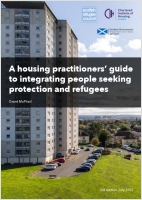Advising British and Irish citizens
Contents:
Are you a returning British or Irish Citizen?
If you are a British citizen (or in some cases, a Commonwealth citizen with long residence) you have a ‘right of abode' in the UK. The ‘right of abode’ is a term used in the law about your status. It means you are free from all immigration controls and have the right to live and work in the UK without any restrictions (Immigration Act 1971, sections 1(1) and 2).
Irish citizens (unlike other foreign nationals) enjoy a unique status in UK law and do not require leave to enter or remain in the UK even though the UK has left the EU (Immigration Act 1971, section 3ZA). This also means for housing and benefit purposes Irish citizens are not counted as being ‘subject to immigration control’ (Immigration and Asylum Act 1999, sections 115(9), 118(6) and 119(4)).
Are you the family member of a British Citizen?
Different rules apply regarding your rights to housing and/or benefits if you are the family member of a British or Irish citizen (including British/Irish family members who could apply to the EU Settlement Scheme.
Other British nationals and Commonwealth citizens
If you have a form of British nationality which is not British citizenship (e.g. if you are from a UK overseas territory) your rights to housing and benefits are the same as any other non-European foreign national and depend on whether you have been granted indefinite leave or limited leave by a UK immigration officer.
If you are a Commonwealth citizen with a ‘right of abode’ your rights to housing and benefits are the same as a British citizen.
How does this affect your rights to housing and benefits?
In Scotland, if you are British or Irish you are entitled to local authority housing or homelessness assistance (this is because you are not subject to immigration control and, unlike the rest of the UK, there is no residence requirement in Scottish law). You can also apply for accommodation from a private landlord or direct from a housing association regardless of whether you have worked here.
In Northern Ireland, if you are British or Irish you must be habitually resident to be entitled to homelessness assistance or to join the Housing Executive’s waiting list (The Allocation of Housing and Homelessness (Eligibility) Regulations (Northern Ireland) 2006, regulation 3 and 4).
In Scotland and Northern Ireland, if you are claiming benefits (universal credit, state pension credit and housing benefit) you must also show that you are habitually resident in the British Isles or Ireland to be entitled.
How do you meet the habitual residence test if you are British or Irish?
If you have always lived in the UK or Ireland then you meet the requirement to be habitually resident. But you may be disqualified from benefits (or in Northern Ireland, housing) if you have lived abroad, i.e. you were habitually resident there and are returning to the UK, or if you are entering the UK for the first time (for example, if you acquired your citizenship through your parents).
If you are returning to the UK after having lived abroad, you can satisfy the habitual residence test and qualify for benefits in the following ways:
- Through actual habitual residence. The decisions about whether you are habitually resident and/or any period of disqualification depend on the facts in your case. Note that your habitual residence resumes immediately on your return if you have a single short absence (such as a holiday or visiting relatives).
- You are an Irish citizen who applied to the EU Settlement Scheme and who has pre-settled status. You are exempt from the test if you qualify as an EEA worker or self-employed person. But you can’t claim this exemption once you acquire EU settled status.
- Deported from another country. If you have been deported to the UK from another country, you do not have to be habitually resident and are entitled) if you claim universal credit/housing benefit and council tax rebate to help you pay your rent or council tax or apply for housing or homelessness assistance.
- You were resident in Israel, Palestine or Lebanon before 7 October 2023 and left due to the escalating violence.
- You were resident in Sudan before 15 April 2023 and left due to the escalating violence.
- You were resident in Ukraine before 1 January 2022 and left due to the Russian invasion.
- You left Afghanistan on or after 15 August 2021 due to the collapse of the Afghan government.
- For HB only, if you receive state pension credit.




